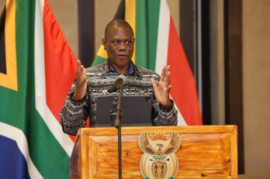
Deputy President Paul Mashatile has acknowledged that the country’s efforts to promote economic growth through investments and infrastructure development have yet to yield satisfactory results due to slow economic growth.
Delivering the keynote address at the annual Nedlac Organised Labour School held at Kievits Kroon in Pretoria on Tuesday, Mashatile cited ArcelorMittal South Africa's recently proposed closures and reduction in production in the steel industry, which is expected to impact thousands of direct and indirect jobs.
The Deputy President noted that some companies in the mining sector have implemented significant employment cuts.
“Through our collective efforts, we have developed collectively-agreed sector plans. However, all stakeholders of Nedlac [National Economic Development and Labour Council] must bear the responsibility of facilitating the speedy execution of these plans so they can live up to our expected outcomes. There is evidence that we can do this,” the Deputy President said.
He believes that a 1.5% economic growth is insufficient to tackle some challenges facing the country.
“We want to see much bigger growth going forward to address the challenges. In a way, the austerity measures are a result of an economy that is not growing as fast as we had envisioned.“
The Nedlac Organised Labour School takes place every year to evaluate the current state of the labour market and the challenges that workers face in the country.
Delegations from various labour federations, guests from the International Labour Organisation, and representatives from government departments filled the conference room.
The Deputy President reviewed policy programmes designed to ensure decent employment for the majority of South Africans in the past three decades.
He emphasised substantial improvements in labour conditions, unemployment rates and social benefits.
“We have also introduced the minimum wage, the two-pot retirement system, as well as other policies that cushioned workers and the poor.”
However, despite progressive interventions, the Deputy President stated that challenges such as high unemployment, poverty, inequality, crime and gender-based violence persist.
He believes that the COVID-19 pandemic tested the resilience of the labor sector and exposed vulnerabilities within the economic framework.
“It is through the collective efforts of government, unions, and the private sector that we were able to protect millions of workers’ livelihoods, even in the middle of adversity.”
In addition, the State was also instrumental in the introduction of improved retirement packages and social benefits for dependents of labour union members, providing greater financial security for workers and their families.
There is a silver lining amid the challenges, the Deputy President said, as South Africa’s official unemployment rate decreased from 33.5% in the second quarter to 32.1% in the third quarter. This marks the first decline in a year and indicates a positive shift in the labour market.
G20
The country’s second-in-command turned his attention to South Africa hosting the Group of Twenty (G20) Leaders’ Summit this year -- a first for an African country.
Mashatile believes that hosting the G20 will help advance Africa’s development agenda, as well as that of the Global South.
“We, therefore, expect that labour in South Africa, will, through the Civil Society 20 (C20), contribute to discussions that will reshape the global agenda, as we seek to resolve the challenges of poverty, unemployment and inequality, but also reframe and reposition global financial institutions towards social justice.”
The G20 aims to ensure that world leaders pay attention to the recommendations and demands of organized civil society.
As the nation forges ahead, Mashatile said it is imperative to harness the collective power of all stakeholders – unions, government and the private sector – to ensure that South Africa’s labour market is inclusive, fair and globally competitive.
“We must address income inequality and improve the quality of life for our workforce. We are not merely fostering economic growth but building a South Africa where every worker feels valued and empowered.”
He called on everyone in the room to recommit themselves to the values of solidarity, equity and justice.
“The labour movement, as the backbone of our nation, holds the power to drive South Africa’s economic transformation. Together, through collaboration and collective action, we can overcome the challenges of the 21st century and create a future of dignity, equality and prosperity for all workers.”
Mashatile noted that the Nedlac Organised Labour School session coincides with the World Economic Forum, where President Cyril Ramaphosa and other government leaders are representing the nation.
The team, led by the President in Davos, Switzerland, will advance South Africa's position on important global issues, particularly those related to economic development, as a key player in the global economy and within the continent. – SAnews.gov.za


